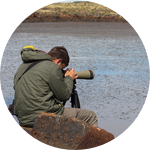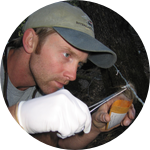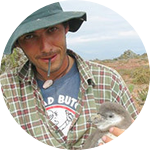About This Project
Fiordland Crested Penguins breed in the coastal rainforest of New Zealand. Although they inhabit a region that is increasingly popular for tourism, very little is known about them. Fiordland Penguins are often inaccessible at sea but by collecting blood and feather samples, we can open a window into their diet through stable isotopic analysis. This information is crucial to understanding the future survival of this species, particularly in the light of global climate change.
Ask the Scientists
Join The DiscussionWhat is the context of this research?
Fiordland Crested Penguins are endemic to New Zealand. They nest in the coastal rainforests but must return to the sea to feed. In recent years, we have learned more about other penguin species, but the Fiordland Penguin remains the least studied. The Tawaki Project launched a long-term project into their marine ecology and is collaborating with our project to create a more complete picture of their foraging niche. Our stable isotopic approach uses the unique signatures of carbon and nitrogen in tissues to isolate food web interactions. This technique has been used in other species and now it is the Fiordland Crested Penguin’s turn. By combining stable isotopic and ecological niche models, we will reveal their foraging niche adaptability.
What is the significance of this project?
This project is very significant in that it will be the first to use stable isotopic analysis to investigate the foraging preferences of Fiordland Crested Penguins. We will identify the trophic feeding position of Fiordland Penguins and corroborate this information with existing GPS tracking data. As global climate change affects the oceans at an unprecedented rate, the availability of crucial prey species may shift causing a strain on Fiordland Penguin populations. The data gathered by this project will reveal how adaptable Fiordland Crested Penguin foraging strategy is and will allow a prediction of how they will respond to global climate change.
What are the goals of the project?
The overall goal of this project is to assess the foraging niche of Fiordland Crested Penguins. First we will collect blood and feather samples at Jackson Head, Milford Sound, and Codfish Island* as well as local prey samples to create stable isotopic mixing models for each of these locations. This, along with ecological data collected in the field, will be used to construct ecological niche models for both the the penguins and their prey. The data gathered along with the long-term data from the Tawaki Project will be directly applicable to ongoing conservation efforts to protect this threatened species.
*Due to strictly regulated access, samples from Codfish Island will be collected by a dedicated team associated with the Tawaki Project.
Budget
Unfortunately there are few Fiordland Crested Penguins in West Virginia (0 in fact), so travel to remote field sites in New Zealand is necessary to understand their foraging niche. Once samples have
Stable isotopic analysis requires careful preparation and storage of samples and the use of specialized equipment. The remainder of the budget will be used for supplies to properly collect and store samples in the field and prepare them for analysis.
None of this is possible without your support. This is your chance to actively participate in protecting the least studied species of penguin in the world. All support helps us reach our goal. As a supporter, you will have unique access to pictures and updates from the field (penguin pictures for everyone!) and you will be helping us understand and protect this threatened species.
 Project Timeline
Project Timeline
Field work will begin in September and continue through the end of the year. Once the field season is complete, samples will be prepared in the lab and stable isotopic analysis will be conducted from January through May. Stable isotopic mixing models and ecological niche models will be created and assessed from June until the completion of my thesis.
Sep 01, 2017
Travel to New Zealand and start of field sampling.
Dec 01, 2017
Completion of sampling and return to US.
Jan 01, 2018
Begin sample preparation for analysis.
Mar 01, 2018
Begin stable isotopic analysis
Jun 01, 2018
Complete analysis and begin interpretation
Meet the Team
Affiliates
Affiliates
Jeff White
I completed my Bachelors of Science in Organismal Biology and Ecology at Middle Tennessee State University. During this time, I was involved in undergraduate research on the occurrence and thermal biology of an invasive zooplankton, Daphnia lumholtzi. This experience peaked my interest in wetland ecology. I presented my work at both university and state wide conferences. I also spent time as an avian intern at the Nashville Zoo where I gained invaluable experience in the safe handling on a variety of avian species.
Following graduation, I spent time in Santa Cruz Province, Argentina with the Proyecto Macá Tobiano (Hooded Grebe Project). During my stay, I participated in surveys and colony monitoring of the endangered Hooded Grebe (Podiceps gallardoi) as well as invasive predator trapping. Prior to the project, I went on an excursion to Isla Martillo in Tierra del Fuego where I had my first encounter with penguins in the wild. This brief visit combined with my time spent in the field convinced me that avian research was the right path for me.
This past year I joined Dr. Herman Mays’ lab at Marshall University as a Masters student. I started immediately on a project to genetically sex several hundred Northern Rockhopper Penguin (Eudyptes moseleyi) blood samples for Dr. Antje Steinfurth’s project in Tristan da Cunha. I am interested in penguin ecology and have developed this project focusing on Fiordland Crested Penguin foraging niche as my Masters thesis work.
https://www.instagram.com/jwhite4872/
https://twitter.com/jeff_white618
Herman Mays
Being a research zoologist is a childhood dream come true. I've long been fascinated by the diversity of living things, especially animals, and have come to learn that we may explain life's diversity under a single, very powerful conceptual framework, evolution.
My graduate work at the University of Kentucky and later postdoctoral work at Auburn University was focused on avian mating systems and reproductive behavior. Throughout my career I've used molecular genetic tools in my work. DNA can tell us how two individuals are related in a population and thus help uncover the sometimes elusive mating decisions made by animals in the field or tell us how two species are related thereby addressing deeper questions on evolutionary diversification. Since my origins as a behavioral biologist my research has shifted to the study of population and species history using molecular genetic tools.
I've been especially interested in recent years in how evolution has shaped the biological diversity of Southeast and East Asia since my first research in this region in Taiwan nearly 17 years ago. Since then I've traveled to Taiwan, China and Japan several times exploring mountains and isolated islands in the region collecting genetic samples to unravel the mysteries of the region's birds. My colleagues and I have collected hundreds of DNA samples from birds in the region and used genetic data to publish phylogenetic work on the endemic Asian bird genus Liocichla, to solve puzzles of species diversity in the Light-vented and Taiwan Bulbuls and the Varied Tit, in collaborative work on the evolutionary history of Asian Tailorbirds, and in studies coupling genetic history with climate history in an endemic bird in Taiwan.
I also have a keen interest in broadly sharing my enthusiasm for biodiversity, evolution and scientific research in general, through informal museum education and programming and through the internet and social media via my web page, Twitter, and Flickr.
Jack Hopkins
Dr. Hopkins is a carnivore ecologist with over 15 years of experience using noninvasive sampling and stable isotopes to inform wildlife management programs. He earned his PhD from Montana State University studying the foraging behavior of black bears in Yosemite National Park using DNA and stable isotopes. Since then, he has studied a variety of species, including critically Endangered Mediterranean monk seals, Threatened grizzly bears, protected humpback whales, hunted ducks, and invasive rats. Currently, he is using DNA and stable isotope analysis to investigate the causes and consequences of diet variation in brown bears in Slovenia, carnivores in southwestern China, and black bears in Maine. In addition to being a professor at Unity College, he is also an Associate Editor at the Journal of Mammalogy and a Fulbright Scholar.
Thomas Mattern
I see myself as a marine ecologist with research emphasis on behaviour
of seabirds. I have 15 years of experience in planning, leading and
executing field work and research projects in New Zealand and Chile.
Research focus on foraging & spatial ecology, demography and
population dynamics, personality traits of seabirds. Further research
interest development of novel analysis methods and software tools to
handle large data sets (‘big data’) via cloud-based computing solutions
(e.g. http://www.actave.net) and crowdsourcing.
Lab Notes
Nothing posted yet.
Project Backers
- 0Backers
- 0%Funded
- $0Total Donations
- $0Average Donation



